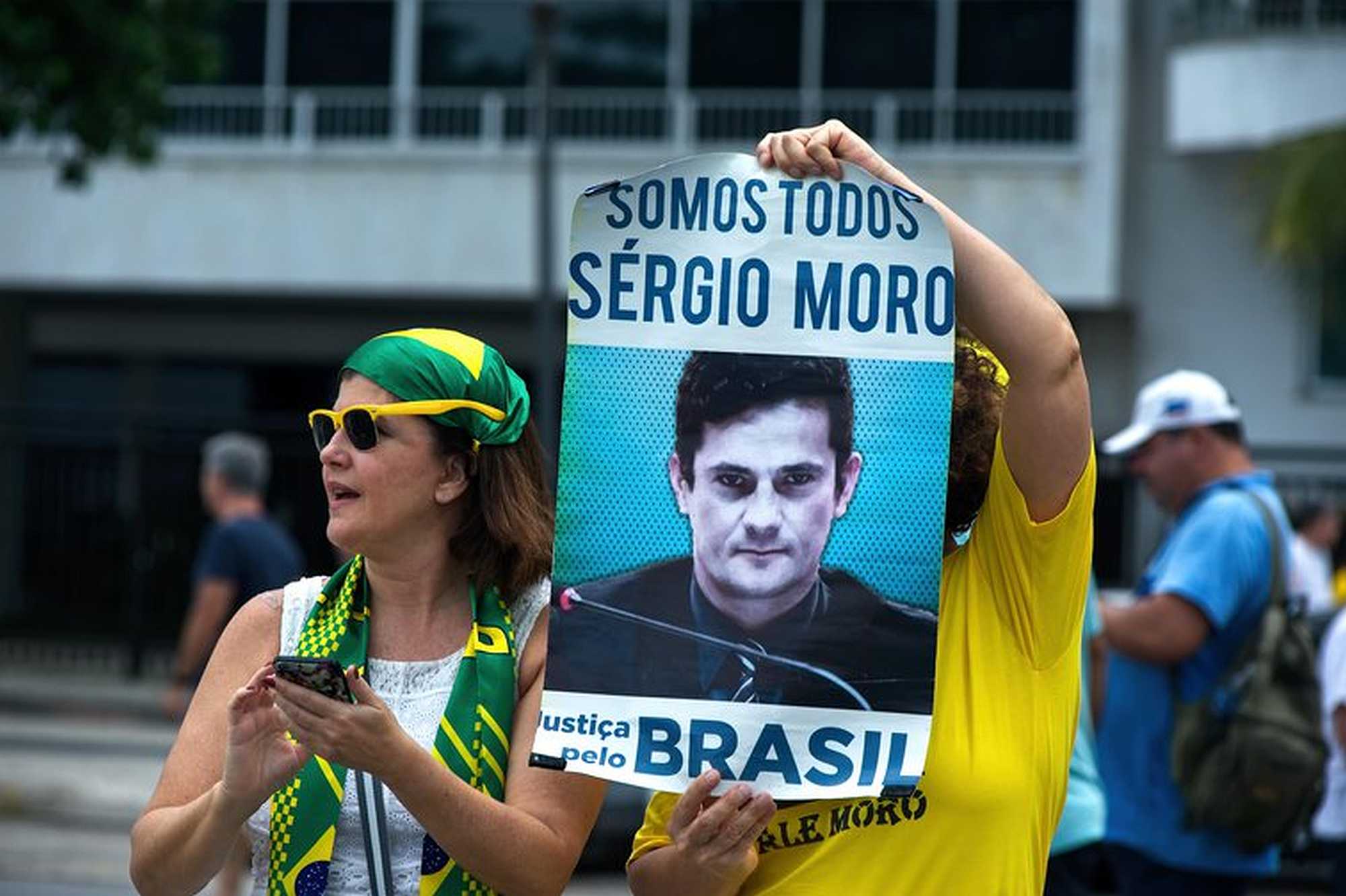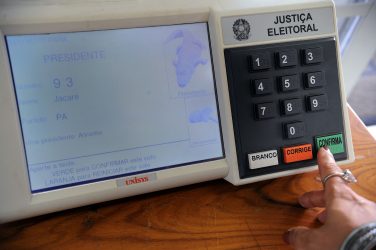For some years now, Brazilians have got used to adjusting our opinions to fit a particular political stance. The need to shape reality according to our political preferences was played out again in the widespread criticism of two recent Supreme Court rulings that annulled several trials presided over by the former judge Sergio Moro.
Polarization has affected public understanding of these court decisions in a variety of ways. The first decision was issued by Justice Edson Fachin on March 8 and annulled the criminal convictions for corruption handed down to Brazil’s former president, Luiz Inácio Lula da Silva.
The second, on March 23, was a majority decision by three of the five justices of the Second Chamber of the Supreme Court and declared that Sergio Moro acted in a biased manner in the criminal proceedings against Lula, rendering null and void not only the criminal convictions but all the procedural actions taken by Moro.
Despite the criticism, such decisions are a breath of rationality in an environment of “legal flat-earthers”, where it has become common for people to hold opinions about court cases based on political instead of legal criteria.
The Wrong Reasons
Ideological entrenchment has generated a sort of social network nihilism in Brazil, in which part of the population believes only in information and news consistent with their own opinions. From our respective ideological bubbles, we feel empowered to opine grandiloquently on any issue in WhatsApp groups, Twitter, Facebook, and so on.
This happens even in areas of knowledge based on scientific evidence, such as epidemiology (there are those who believe that COVID-19 is just a simple cold overhyped by the left) or astronomy (a survey in February 2020 revealed that 7% of the Brazilian population are “flat-earthers”, people who believe that the Earth is flat rather than a sphere, a belief abandoned at the beginning of modernity in Europe).
If even natural phenomena give rise to ill-considered opinions in Brazil, we could not expect much discernment in interpreting Supreme Court decisions that allow Lula – a figure who arouses both love and hate – to run as presidential candidate in the 2022 election.
To be sure, I am convinced of Lula’s political and moral responsibility, as former president and leader of the Workers’ Party, for the increase of corruption in the Brazilian political-party game.
Apart from the obvious irregularities committed by judges and prosecutors in the framework of the Car Wash probe (operação Lava Jato), Lula’s image is still linked to the corruption scandals that resulted in the arrest of several political bosses of his party and its allied base, and which were the background of Dilma Rousseff’s impeachment in 2016.
A survey conducted last March 16 indicates that 57% of the population considers Lula’s criminal convictions fair. But if we disregard our personal impressions, it is entirely possible that Lula is responsible for acts of corruption and, at the same time, has been illegally convicted, thus enjoying the right to have his trial reviewed by higher courts.
Likewise, it is possible that a judge with a reputation as a champion of the anti-corruption fight may commit irregularities, politicize justice and, in the end, may have erred.
Without Favor
As in other fields of knowledge, jurisprudence in general and criminal law in particular are based on certain principles whose non-observance compromises the legal opinion. The aforementioned Supreme Court decisions have been made precisely because some of those principles were not observed.
Fachin’s decision annulled the convictions against Lula on the grounds that the 13th Federal Court of Curitiba, then under Moro’s lead, was not the competent forum to hear the charges.
In short, Moro invoked the competence of his court to judge any type of criminal complaint against Lula, despite the fact that the Code of Criminal Procedure established that the competent forum was the Federal Court of Brasília.
Following Fachin’s decision, opinions have abounded that the Supreme Court is part of a conspiracy that seeks to deflate the fight against corruption. I do not have the means to seriously reflect on this kind of opinion, but there are plenty of reasons to conclude that the decision favors Moro and the prosecutors of the Car Wash Case more than Lula himself.
Since June 2019, conversations have been shared that show evidence of collusion between federal prosecutors and Sergio Moro to coordinate the production of evidence, in flagrant violation of the principle of judicial impartiality and of the provisions of Article 254, literal IV, of the Brazilian Code of Criminal Procedure, which prohibits the judge from giving advice to one of the parties to the proceedings.
In his decision, Fachin limited himself to rejecting the territorial jurisdiction of the 13th Federal Court and declared the objection that Moro was biased inadmissible. Fachin argued that, having declared the non-competence of the forum, it was not necessary to rule on the alleged partiality of its holder.
According to Article 96 of the Code of Criminal Procedure (“The partiality plea shall precede any other, except when founded on a supervening motive”), the partiality objection must be considered before any other, including the plea of incompetence of the forum. This is for a simple reason: the evidence instructed by a biased judge is null and void and cannot be used in the other acts of the proceeding.
Strictly speaking, Fachin’s decision does not imply an absolute nullity of the evidence. It transfers the criminal complaint to another judicial authority, which will have to decide whether and which evidence is still valid in the new trials that will be pursued against Lula.
Toxic Polarization
Naturally, to many Brazilians, including some jurists, Fachin’s decision is politically driven and seeks to favor Lula. It does not matter if this decision is a sort of Solomonic formula to prevent a more drastic pronouncement on the actions of Sergio Moro and avoid a lethal blow to the Car Wash probe in the Supreme Court.
For part of the population, it is irrelevant whether the decision is grounded in the law, or even whether the applicable legal rules required a ruling on the merits of other procedural issues, such as the bias of the trial judge.
Three of the five justices of the Supreme Court’s Second Chamber amended Fachin’s attempt to adjudicate only some parts of the case involving Lula. The expansion of the jurisdiction of the 13th Federal Court of Curitiba to judge any act of corruption in the governments of the Workers’ Party is a minimal deviation from due process, if compared to what the court in the original trial allegedly did: namely, the coordination of evidence with the federal prosecution to direct the investigations, accelerate procedural acts and discard evidence favorable to the defendant, among other irregularities that sought to ensure a conviction.
It is entirely possible that Lula is responsible for acts of corruption and, at the same time, has been illegally convicted.
In an interview granted some months ago to a Brazilian newspaper, the Italian jurist Luigi Ferrajoli emphasized that “in any other country, Judge Moro’s behavior would justify suspicion, due to the explicit lack of impartiality and the repeated preempting of his rulings.”
Fortunately, in the recent decision of March 23, the majority of the Supreme Court justices preferred to follow the law, rather than media pressure to prevent the political resurrection of Lula and avoid moral condemnation of Sergio Moro.
In an extremely polarized environment, it has become commonplace to resort to personal beliefs to form an opinion, even about subjects like the most effective treatment for COVID-19, the origin of the virus (there are those who think it was created in Chinese laboratories for geopolitical purposes), or the very existence of the pandemic. Such toxic polarization has only recently been aimed at microbiology and scientific knowledge about pandemics.
Long before COVID-19 found a perfect symbiosis with scientific denialism, and before Brazil became the world epicenter of the disease, legal flat-earthism was already encouraging most of the population to see a decision to annul criminal proceedings that fail to follow the law as a mistake.
In such an environment, procedural irregularities and judicial demagoguery tend to be more highly valued than the elementary principles of the administration of justice in a state governed by the rule of law.
Daniel Cerqueira is a Brazilian lawyer, currently serving as Director of the Human Rights and Natural Resources program at the Due Process of Law Foundation (DPLF) in Washington. Twitter: @dlcerqueira
This article appeared originally in Open Democracy – https://www.opendemocracy.net/












